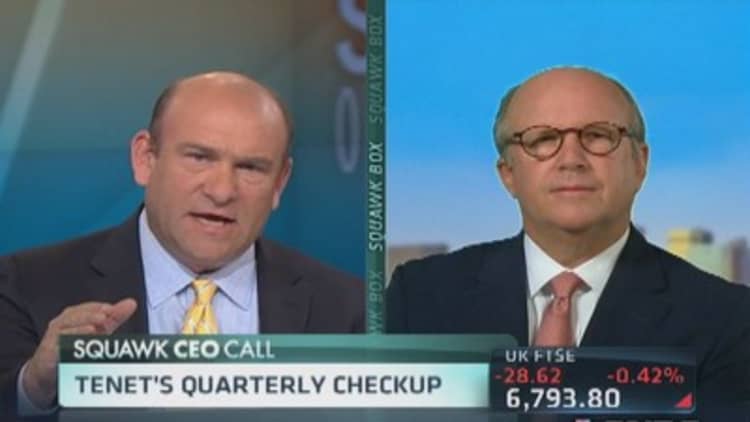Massachusetts' crippled Obamacare exchange is just the latest to throw in the towel and scrap its existing software, but health-care experts said it likely won't be the last.
Those same observers Tuesday told CNBC that almost half of the existing state-run Obamacare marketplaces could, in the coming years, end up turning enrollment operations in private insurance plans over fully to the federally run HealthCare.gov for a variety of reasons.
"Certainly, I think you will see even more states default to the federal exchange, certainly up to a half-dozen states," said Bryce Williams, managing director of exchange solutions for Towers Watson, which operates private health insurance marketplaces.
Williams also said, "I do think that the vast majority of the states on the federal exchange are likely to continue with the federal exchange." There are 36 states on HealthCare.gov—including seven that are in so-called partnership agreements with the federal government, and the remaining being completely operated by the federal government.
Williams said several states now running their own exchanges will be lured by "the massive scale" of HealthCare.gov, and its functions, which include its responsibility for verifying individuals' eligibility for government subsidies that can offset the cost of insurance. And, he said, states that are already on HealthCare.gov are going to be less apt than they would have been last year to think about launching their own marketplaces.
"You have to ask if it's worth the risk to start up your own exchange," he said.
Read MoreFBI is probing Oregon's Obamacare exchange: Reports
On Monday, Massachusetts said it was abandoning the software bolstering the deeply troubled Massachusetts Health Connector. That Obamacare online marketplace was built by contractor CGI, and it has never worked as designed since it launched in October despite burning through $170 million.
The state enrolled just 31,695 people in Obamacare private plans in the past six months, mostly through paper applications. In response to the exchange's problems, Massachusetts jury-rigged a system that got tens of thousands of others temporary health coverage.
The failure of the website has been particularly striking because Massachusetts was, under then-Gov. Mitt Romney in 2006, the first state to operate its own health insurance exchange. CGI was hired to help that exchange transform into one that was compliant with the Affordable Care Act, and could sell ACA policies through the Web site.
Massachusetts plans on replacing the software of its current exchange with that of a company called hCentive, which helped build the state-run exchanges of Colorado and Kentucky.
Read MoreSome e-cigarettes deliver a puff of carcinogens
At the same time, Massachusetts, as a safety net in the event that hCentive's software isn't ready when open enrollment starts next November, also is preparing to turn over enrollment in private insurance plans to HealthCare.gov. The dual strategy will cost about $100 million, which is 30 percent what it would cost to fix the existing system.

Williams said Massachusetts' decision to use hCentive's software is a short-term solution that will, if it is up and running by November, help people enroll in insurance plans online.
But because of the advantages offered by HealthCare.gov, Williams said, "it would not surprise me if, in the future, they [Massachusetts' health exchange] end up fully connecting to the federal exchange and using their software."
Defaulting to HealthCare.gov
The state's decision is a hybrid of recent moves taken by two other troubled state Obamacare marketplaces that have abandoned their original software model. Oregon's health exchange two weeks ago voted to turn enrollment to HealthCare.gov, and Maryland is buying software that also was used on Connecticut's successful marketplace.
The three states represent one-third of the 15 exchanges being operated by individual states or the District of Columbia.
Read MoreState(s) of Obamacare: Big boosters come up short
Joshua Archambault, a senior fellow of the Foundation for Government Accountability think tank, has closely followed the woes of the Massachusetts exchange, and called it "an utter disaster."
He expects other states to follow this example. "Nevada, potentially Hawaii," Archambault suggested. He also expects Minnesota may get out of the exchange business, and shift to HealthCare.gov. All of these states had technical problems that hampered enrollment.
But other states may move onto HealthCare.gov because of the cost of running a standalone exchange, Archambault said.
Officials in Colorado, whose exchange was built in part by hCentive, are currently trying to figure out how that martkeplace will sustain itself financially after federal funding runs out.
In the state house of Rhode Island, whose own exchange is faced with a similar problem, there is "a bipartisan bill to push their exchange to the federal exchange," Archambault said. He added, it could take several years for all of the states who end up moving to HealthCare.gov to decide to make that move.
Read MoreObamacare hasn't freed up ERs: Hospital CEO
Dan Mendelson, the CEO of the Avalere Health consultancy, said those coming years might offer even more incentive for some states to drop their exchanges and move to the federal marketplace.
Over that time, Mendelson said, the federal government will "update their own systems" on HealthCare.gov to accommodate rule changes or to accomplish technological efficiencies. "The states will have to do that" on their own exchanges as well, he said.
By turning over enrollment functions to HealthCare.gov, Mendelson said, those states will be off the hook for those system tweaks.
If more than a handful of states end up chucking their own exchanges in favor of the federal exchange, it would further underscore the dramatic turnaround at HealthCare.gov. In its first two months of operation last fall, the federal site's technological troubles delayed enrollment for thousands.
"It's interesting, because this federal system was really intended as a backup in case the states did not go down the road themselves" and build their own exchanges, Mendelson noted.
—By CNBC's Dan Mangan.


